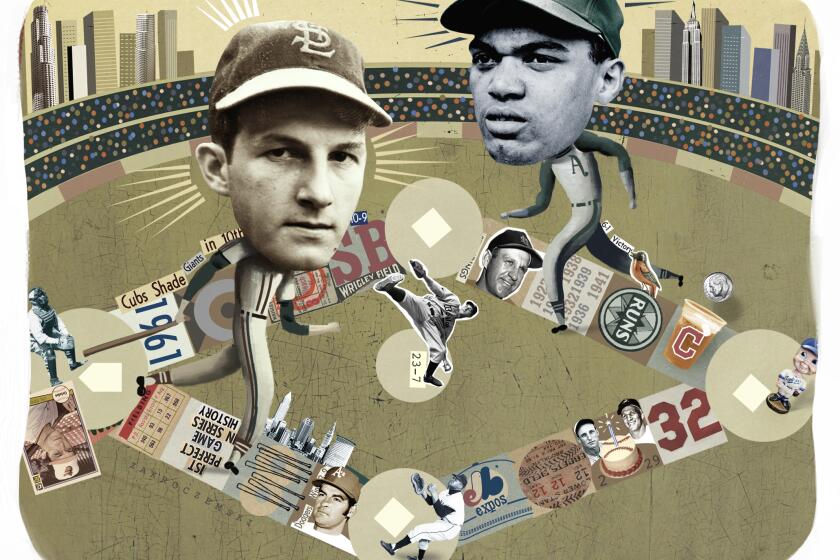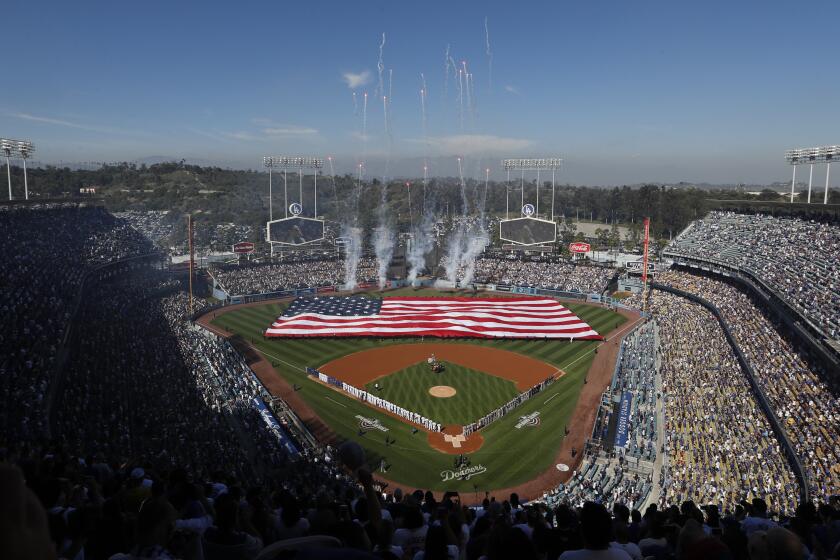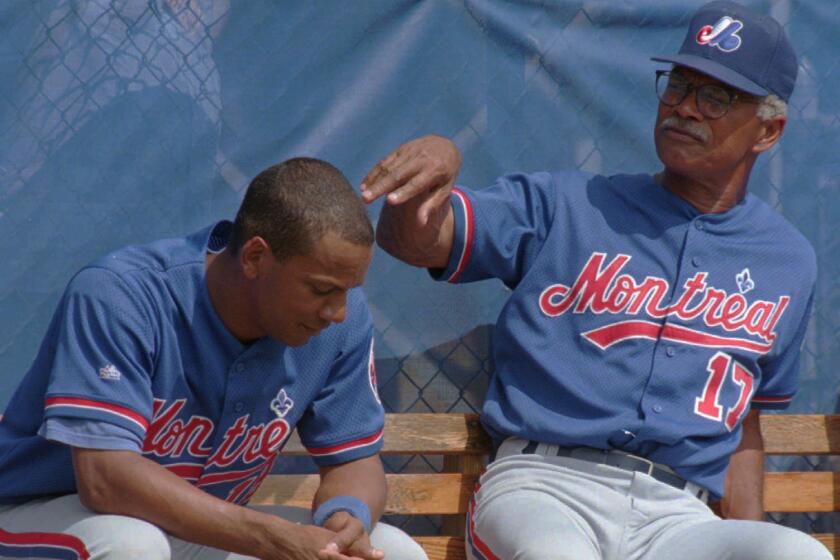Many try, but few finish, the world’s toughest baseball quiz

The Baseball Trivia Contest at the 49th SABR conference welcomes fans from all over to test their knowledge of the game, its players and its history.
- Share via
SAN DIEGO — Even by the standards of baseball’s most arduous trivia competition, and even to the competitors whose brains overflowed with arguably useless knowledge, this question was ridiculous.
Other questions had made you think. Some had made you laugh. This one might have driven you to curse.
Who better to solve trivia riddles than the fans dedicated to the study of the sport? The Society for American Baseball Research, or SABR, gathered in San Diego for its annual summer convention, four days of seminars, speakers and studies, with the final night reserved for the annual trivia test.
Covering a trivia contest is fun, but also a reminder that MLB needs to diversify its fan base.
The contest is not for the weak, but even the strong could do nothing but shrug at this question: Which two Hall of Fame players died on the same day?
The contestants did not know. The audience in the hotel ballroom did not blurt out a suggestion.
Finally, a shout from the crowd shattered the silence.
“Jefferson and Adams!”
Modest laughter ensued. Thomas Jefferson and John Adams are the only United States presidents to die on the same day: July 4, 1826.
The correct answer: Stan Musial, the regal first baseman of the St. Louis Cardinals, and Earl Weaver, the plain-spoken manager of the Baltimore Orioles, died Jan. 19, 2013.
So you think you know baseball? This is not the benign trivia that flashes on the video board at Dodger Stadium. This is as if the masochists running the bar exam or the National Spelling Bee had invaded the national pastime.
Try answering some of the questions posed in the annual trivia contest held by the Society for American Baseball Research.
::
The first person I ran into at the convention was Andy McCue, a happily retired baseball researcher and the author of an award-winning book on Walter O’Malley, the owner who ignited baseball’s westward expansion by moving the Dodgers from Brooklyn to Los Angeles. McCue has attended the convention 29 times, written 19 articles in SABR journals and made 15 research presentations at the convention.
He struck me as the epitome of a successful contestant, so I asked whether he would enter this year’s trivia contest. He shook his head, vigorously. He had competed once, years ago.
“I got slaughtered,” he said. “I’ve never been back.”
Certainly then, Sean Forman would enter. Forman created baseball-reference.com, the indispensable database for baseball facts and statistics. In fact, the site settled a dispute in the preliminary rounds of this year’s contest.
Quizmaster Bruce Brown had asked which position players from the defunct Kansas City Athletics had been inducted into the Hall of Fame. Brown’s answer key had two names — Enos Slaughter and Reggie Jackson.
But contestants argued that Tony La Russa and Dick Williams also should have counted as correct answers. Both were inducted into the Hall of Fame for their achievements as managers, but Forman’s site quickly verified that La Russa and Williams indeed played briefly for Kansas City, more than 50 years ago.
Forman makes his living compiling the data that fuel trivia questions and attends the convention every year.
Still, he would not enter this year’s contest. He had tried three times.
“I finished close to last each time. My excuse is that I created the site so I don’t have to remember anything,” he said with a chuckle.
“The trivia contest is way out of my league.”
Brown, the quizmaster since 2009, would be sorry to hear that. He is a franchise consultant by day, but he starts preparing questions for this summer contest each November. By the time the preliminary and final rounds were completed here in June, he had asked 305 questions.
“We believe a difficult question is something anybody can write,” he said. “I want engaging questions.”
So he asked this: In a major league game, in what bodies of water could a home run land? The answers included the obvious (McCovey Cove at San Francisco’s Oracle Park) and the obscure (the fish tank beyond the outfield fence at the Tampa Bay Rays’ Tropicana Field, in which cownose rays swim).
In two preliminary rounds, Brown would whittle the field from 56 competitors to a final four. Each preliminary round features a written quiz of 40 questions in 12 minutes. As time runs out, Brown tells contestants to put down their pencils.
He encouraged me to try, rather than just watch other people agonize over his questions. I too could experience the thrill of victory and, more likely, the agony of defeat.
“Nobody’s going to get skunked,” he said. “Nobody’s going to get every one.”
I made the first cut, thanks to a nugget of local knowledge. Brown asked which Dodgers had been selected most valuable player of a World Series; I recalled the unusual 1981 award, shared by Ron Cey, Pedro Guerrero and Steve Yeager. I struck out in the second round, largely because of my willful indifference to the glory of the New York Yankees.
::
To Brown, some good questions are better than others.
“I like to make the emphasis on the ‘50s to ‘80s, because that is the sweet spot for this crowd,” he said.
He meant the 1950s to 1980s, but he could just as easily have meant the age range. Brown is 69. The four trivia finalists ranged from 54 to 63.
The audience at the convention was uncomfortably similar to the audiences that attend major league games and watch them on television. The average age of a viewer has remained stubbornly above 50.
A rarity was Mark Simon, who works for a company called Sports Info Solutions. He prepares statistics and notes for baseball broadcasts, a job he used to do at ESPN. He has never won the trivia contest and has reached the finals only once, but he wouldn’t miss the convention.
“It’s really cool to be around people who won’t think I’m crazy for knowing the last out of the last 60 World Series,” he said.
He is 44.
“I’m one of the young ones,” he said. “I worry what’s going to happen when I’m in my 50s and some of these people are gone.”
It’s really cool to be around people who won’t think I’m crazy for knowing the last out of the last 60 World Series
— Mark Simon
John Thorn, the league’s official historian, was here too. He comes every year. He enjoys a round of trivia at the bar, and he might reasonably be expected to dominate the trivia competition, but he refuses to enter.
“If I did,” Thorn said, “it would give credence to the idea that trivia and history are the same thing. And they’re not.
“History is more about why things happened and how things happened, and less about what happened and when.”
SABR embraces both. Among the titles of presentations at the convention: “Sweet! 16-Year-Old Players in Major League History,” “Nineteenth-Century Women in Baseball,” and “We Love Baseball, Hot Dogs, Apple Pie and Chevrolet … and Beer, Cat Food and Margarine: Baseball and Advertising in the Era of Mad Men.”
The convention attracted about 450 people. The SABR membership is about 5,300.
“SABR has permitted many of us lonely, introverted people, of which I am at root one, to fly our freak flags high,” Thorn said.
“Nerd culture is no longer on the outside looking in. It is now Bill Gates. It was Steve Jobs. It is all your major corporations. All of your efforts to take sports into the digital arena are done not by the athletes but by the smart backroom guys. Same with the analysts who are running baseball’s front offices.”
::
R.J. Lesch, a business analyst from Pennsylvania, this year advanced to the final four for the first time since 2001. His memory of that contest remains vivid.
“I was on stage with this obscure baseball researcher named Bill James,” Lesch said. “I got buried.”
James, the godfather of modern statistical analysis, did not win in 2001 either. In popular culture, James is perhaps best known for voicing his character in a 2010 episode of “The Simpsons.”
“I made baseball as much fun as doing your taxes,” James’ character said.
Another finalist, Philippe Cousineau, was the easiest guy to spot at the conference. Wherever he goes, he wears a weathered Montreal Expos cap, in the famous tricolor version.
Cousineau lives in the Quebec town of Gatineau, two hours from Montreal. No matter, he said, everyone loved the Expos.
“They were our team, no question about it,” he said. “It’s like people in small New England towns that follow the Red Sox.”
He carried his love for the Expos around the world, as a foreign service officer, representing Canada in such locales as Jordan, Morocco, Turkey and the Soviet Union, “which became Russia while I was there.” After the Expos moved to Washington in 2005, he started a local SABR chapter to help keep baseball interest alive in Quebec.
(Trivia: Since 1971, the Expos are the only major league team to move.)
The talent-laden Montreal Expos were 74-40 and in first place when the strike took place. Ownership slashed payroll the next year and the team never recovered.
Cousineau entered the trivia contest for the first time. He made the final four but was the first eliminated.
Lesch was the second, losing a written tiebreaker when the last line on his list of expansion teams read “San.”
“I ran out of time for the ‘Diego,’ ” he said.
That left two men standing, one of whom was the heavy favorite: Bill Carle, a database administrator from suburban Kansas City. He arrived as a three-time champion, and he was attending the convention for the 41st consecutive year. He had not planned on coming to this one, until his wife bought him a plane ticket.
“She knew I was going to be difficult to live with,” he said, “knowing the convention was going on without me.”
Carle took on Brian Wood, a first-time finalist from Pacific Grove, Calif. Wood’s father was a naval aviator, and so his favorite team followed his father’s travels: the Yankees, San Francisco Giants, Washington Senators, Orioles, then back to the Giants.
“Baseball was always there,” he said.
Wood also followed his father as a naval aviator. He flew 45 missions into Iraq and Kuwait during Operation Desert Storm, and he conducted air patrols off the coasts of Libya and Vietnam. He would keep up with baseball as best he could, usually with a copy of the Sporting News that might arrive by mail weeks after its publication.
Carle sat at one table on the stage, Wood at a table on the opposite side. Brown invited the players to select questions from categories on a faux “Jeopardy” board projected onto two large screens.
Here in baseball land, what would be called a “daily double” on the real “Jeopardy” show was termed a “doubleheader.” Players buzzed in with the correct answer, but not often.
The audience sat quietly as Carle and Wood fielded questions ranging from difficult to insanely difficult. Then came this one: What unusual coincidence unites four-time All-Stars Pepper Martin and Al Rosen?
Carle knew, somehow, that both men had been born Feb. 29 (Martin in 1904, Rosen two decades later). The crowd rewarded Carle with a collective gasp, and a loud ovation.
Of the last 18 questions, Carle correctly answered four, Wood two.
Carle won for the fourth time, tying the all-time record. He accepted congratulations and an old Cal Ripken Jr. baseball card as a prize. The other competitors gathered their wits and headed into the night, saying the same four words recited each autumn by fans of every team but the one that wins the World Series: Wait till next year.
Sign up for our daily sports newsletter »
More to Read
Go beyond the scoreboard
Get the latest on L.A.'s teams in the daily Sports Report newsletter.
You may occasionally receive promotional content from the Los Angeles Times.












